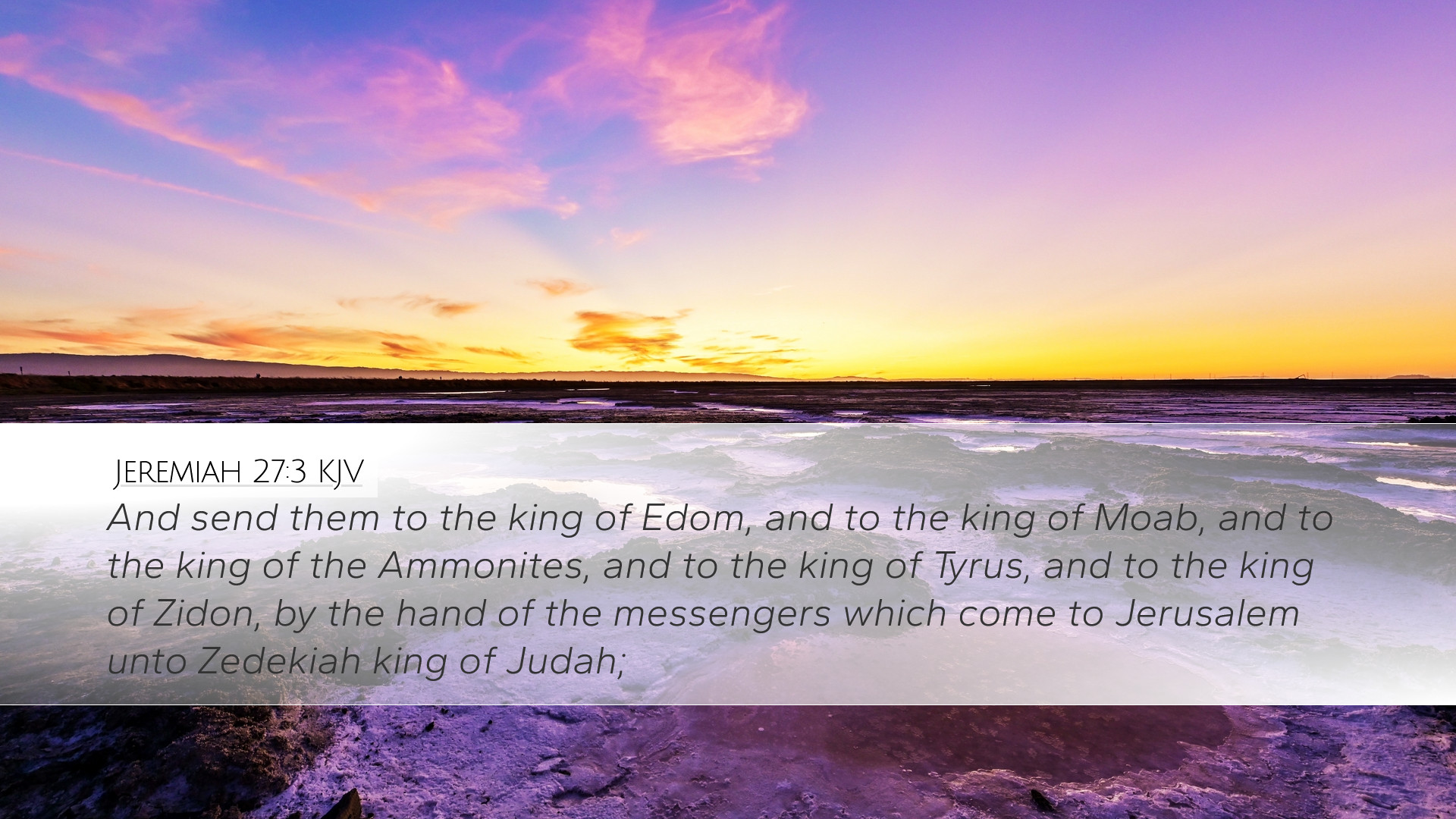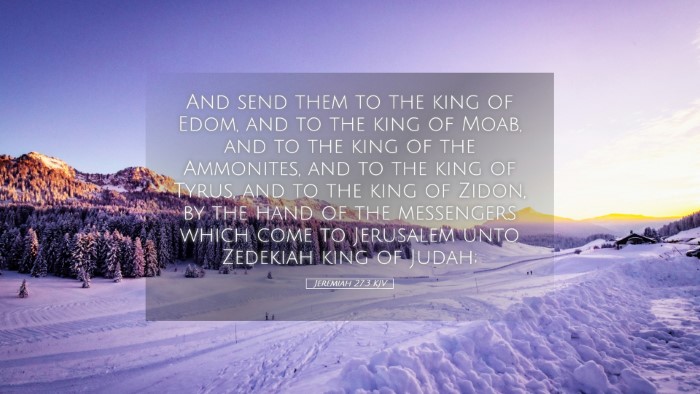Bible Commentary on Jeremiah 27:3
Verse: "And send them to the king of Edom, and to the king of Moab, and to the king of the Ammonites, and to the king of Tyre, and to the king of Zidon, by the hand of the messengers which come to Jerusalem unto Zedekiah king of Judah." (Jeremiah 27:3)
Introduction
The prophetic book of Jeremiah has long been recognized for its profound theological insights and historical context. Jeremiah 27:3 stands as a pivotal verse that underscores the significance of alliances and prophetic counsel in the face of impending geopolitical upheaval. In this commentary, we will explore various insights from public domain commentators to glean a deeper understanding of this scripture.
Historical Context
The context of Jeremiah 27 is vital in understanding the prophetic message delivered by Jeremiah. At this time, the Kingdom of Judah was under threat from Babylon, and various nations, including Edom, Moab, Ammon, Tyre, and Zidon, were under Babylonian influence or threat. Jeremiah’s prophetic message included warnings against false prophets and calls to submit to Babylonian rule as part of God’s sovereign plan.
Matthew Henry's Commentary
Matthew Henry emphasizes the role of the messengers and their task of communicating God's message to the rulers of surrounding nations. He points out that Jeremiah is instructed to send letters to these kings, which reflects God's universal authority over all nations, not just Israel. Henry articulates that God's sovereignty extends beyond Israel, and He governs the affairs of all nations.
- The Sovereignty of God: Henry notes that God controls the rise and fall of nations and that this message to foreign kings underscores His dominion.
- The Role of Messengers: The sending of messengers signifies the importance of communication in God's plan.
- Prophetic Authority: Jeremiah’s authority as a prophet is underscored in his direction to reach out to other nations, demonstrating that God’s word is meant for all people.
Albert Barnes' Notes on the Bible
Albert Barnes provides a detailed analysis of the political implications embedded within this verse. He highlights that the inclusion of multiple nations signifies the breadth of Israel’s interaction with its neighbors and illustrates the complex political landscape of the time.
- Political Alliances: Barnes discusses how alliances among these nations often led to conflicts and prophetic warnings against alliances contrary to God’s will.
- The Message of Submission: He notes that Jeremiah’s message called for Judah to submit to Babylon as a form of divine judgment rather than attempting futile resistance.
- Divine Purpose: Barnes concludes that this verse reveals God's purpose for the nations and the flow of history under His guidance.
Adam Clarke's Commentary
Adam Clarke offers insights into the specific recipients of Jeremiah's message, emphasizing the relevance of each nation mentioned in this verse. Clarke outlines the historical relationships between Judah and these nations, noting the various alliances that existed.
- Inter-National Relations: Clarke elaborates on the historical animosities and alliances that characterized the relationships between Judah and these kingdoms, framing the sending of letters as a strategic move.
- God's Judgment and Mercy: He discusses how the messages serve both as warnings and calls to repentance, showing God’s desire for all nations to acknowledge His sovereignty.
- Prophetic Reliability: Clarke emphasizes the necessity of heeding the true prophets of God amid a rise of false prophets promising peace.
Theological Reflections
The implications of Jeremiah 27:3 extend beyond its immediate historical context to provide rich theological insights that are relevant for contemporary Christian practice.
The Universal Nature of God's Sovereignty
This verse illustrates that God’s authority is not limited to His chosen people, Israel, but encompasses all nations. As pastors, students, and theologians study this passage, they are challenged to consider God's providence over global affairs, opening a dialogue about God's plan for salvation and judgment across all cultures.
Prophetic Integrity in a Pluralistic World
In a world filled with competing voices and prophetic claims, Jeremiah’s call to recognize true prophetic voices resonates with contemporary issues. Students of scripture are encouraged to cultivate discernment in evaluating messages they receive from various sources within and outside the church.
Submissive Attitude Towards Divine Will
The call to submission in this verse can be perceived as a challenge to modern believers. Reflecting on the political turbulence of our times and the church's role within it, this text serves as a reminder of the importance of seeking God's guidance, even when circumstances appear dire.
Conclusion
Jeremiah 27:3 serves as a powerful reminder of God's sovereignty over nations and the ongoing relevance of prophetic messages in a chaotic world. By engaging with the insights provided by commentators like Matthew Henry, Albert Barnes, and Adam Clarke, pastors, students, and theologians can deepen their understanding of how historical events, divine prophecy, and God's overarching plans interweave.
Ultimately, this passage invites readers to reflect on their trust in God's sovereignty and the calling to live out their faith in submission and alignment with His will, regardless of the tumultuous circumstances surrounding them.


